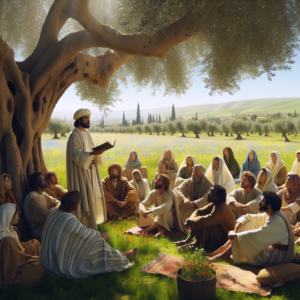From Despair to Redemption: Lessons from The Mayor of Casterbridge and the Bible
Have you ever felt that one grave mistake could ruin your life entirely? This is the plight of Michael Henchard, the lead character in Thomas Hardy’s “The Mayor of Casterbridge.” His journey, filled with loss, guilt, and eventual redemption, mirrors the profound biblical themes of repentance and forgiveness. As we explore Henchard’s story, we’ll uncover timeless biblical principles that speak to the power of transformation and God’s unfailing grace.
The Burden of Past Mistakes
Henchard’s life spirals downward after he sells his wife and daughter in a drunken haze. This decision haunts him throughout the story, showcasing the heavy burden of guilt from past mistakes. Similarly, the Bible addresses this through the story of David, who also struggled with regret and remorse after his sin with Bathsheba (2 Samuel 11-12).
Repentance: The First Step to Healing
In Hardy’s novel, Henchard makes several attempts to redeem himself, although often in flawed ways. His journey to redemption highlights the human need for true repentance. The Bible teaches us that repentance is the first step towards healing and reconciliation with God.
Consider 1 John 1:9: “If we confess our sins, He is faithful and just to forgive us our sins and to cleanse us from all unrighteousness.” This verse underscores the power of admitting our faults and seeking forgiveness, something Henchard struggles with throughout his life.
Forgiveness: Giving and Receiving Grace
Another salient theme in “The Mayor of Casterbridge” is the necessity of forgiveness—not just seeking it but also giving it. Elizabeth-Jane, Henchard’s daughter, embodies this principle by forgiving Henchard despite his flaws and mistakes. Her grace is a reminder of the importance of forgiving others, as illustrated in Ephesians 4:32: “Be kind and compassionate to one another, forgiving each other, just as in Christ God forgave you.”
God calls us to mirror His grace, offering forgiveness to those who have wronged us, thereby setting ourselves free from the bondage of bitterness.
Reflections: Your Personal Redemption Story
– Have you ever felt weighed down by a past mistake like Henchard?
– How have you sought forgiveness, and what steps can you take to genuinely repent?
– Is there someone in your life to whom you need to extend grace and forgiveness?
As you reflect on these questions, consider journaling your thoughts or discussing them with a trusted friend or spiritual mentor.
Moving Forward with Hope
The conclusion of Henchard’s life is tragic, but your story doesn’t have to follow the same path. Remember Romans 8:1: “There is therefore now no condemnation for those who are in Christ Jesus.” This verse is a powerful reminder that through faith and repentance, we are redeemed and set free from the shadows of our past.
As you navigate life’s challenges, let Henchard’s story and these biblical principles guide you towards a life of forgiveness, redemption, and unshakable hope.
Call to Action: Share Your Insights
If Henchard’s journey has touched you, what lessons are you taking away? Have you found parallels in your own life? Share your thoughts and experiences in the comments below. Let’s build a community where we learn and grow together, finding strength in God’s words and in shared stories of redemption.
By engaging with these themes, you’ll not only deepen your understanding of Hardy’s classic but also enrich your spiritual journey. Take a moment to reflect, pray, and embrace the transformative power of God’s grace today.
If you want to learn how ANY book relates to Biblical principles, please try our Books and Scripture GPT. Simply type in the name of a book and let it show you insights you might not have been aware of!


